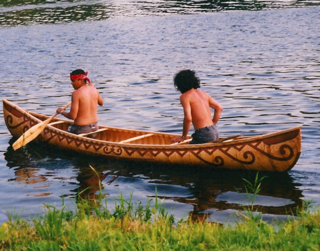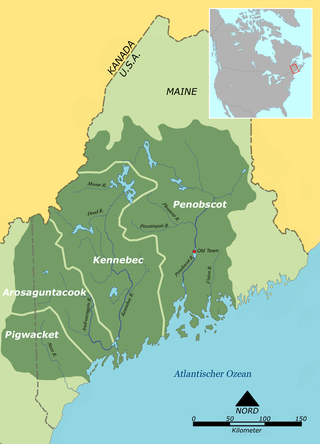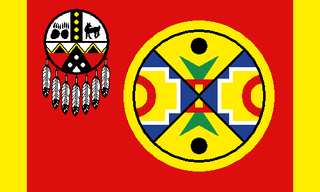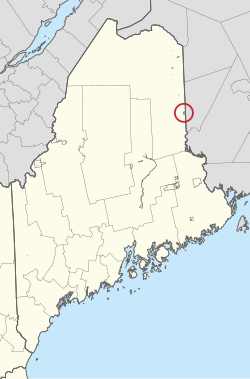
The Abenaki are indigenous people of the Northeastern Woodlands of Canada and the United States. They are an Algonquian-speaking people and part of the Wabanaki Confederacy. The Eastern Abenaki language was predominantly spoken in Maine, while the Western Abenaki language was spoken in Quebec, Vermont, and New Hampshire.

Passamaquoddy Pleasant Point Reservation is one of two reservations of the federally recognized Passamaquoddy tribe in Washington County, Maine, United States. The population was 692 as of the 2020 census.
The Penobscot are an Indigenous people in North America from the Northeastern Woodlands region. They are organized as a federally recognized tribe in Maine and as a First Nations band government in the Atlantic provinces and Quebec.

The Passamaquoddy are a Native American/First Nations people who live in northeastern North America. Their traditional homeland, Peskotomuhkatikuk, straddles the Canadian province of New Brunswick and the U.S. state of Maine in a region called Dawnland. They are one of the constituent nations of the Wabanaki Confederacy.

The Maine Legislature is the state legislature of the U.S. state of Maine. It is a bicameral body composed of the lower house Maine House of Representatives and the upper house Maine Senate. The Legislature convenes at the State House in Augusta, where it has met since 1832.
The Wolastoqiyik, also Wəlastəkwewiyik or Maliseet are an Algonquian-speaking First Nation of the Wabanaki Confederacy. They are the Indigenous people of the Wolastoq valley and its tributaries. Their territory extends across the current borders of New Brunswick and Quebec in Canada, and parts of Maine in the United States.

Cadillac Mountain is located on Mount Desert Island, within Acadia National Park, in the U.S. state of Maine. With an elevation of 1,530 feet, its summit is the highest point in Hancock County and the highest within 25 miles (40 km) of the Atlantic shoreline of the North American continent between the Cape Breton Highlands, Nova Scotia, and peaks in Mexico. It is known as the first place in the continental U.S. to see the sunrise, although that is only true for a portion of the year.

The Maine House of Representatives is the lower house of the Maine Legislature. The House consists of 151 voting members and three nonvoting members. The voting members represent an equal number of districts across the state and are elected via plurality voting. The nonvoting members represent three of Maine's Native American tribes, though two tribes have declined to send representatives. Each voting member of the House represents around 9,000 citizens of the state. Because it is a part-time position, members of the Maine House of Representatives usually have outside employment as well. Members are limited to four consecutive terms of two years each, but may run again after two years.

Harald E. L. Prins is a Dutch anthropologist, ethnohistorian, filmmaker, and human rights activist specialized in North and South America's indigenous peoples and cultures.

The Wabanaki Confederacy is a North American First Nations and Native American confederation of five principal Eastern Algonquian nations: the Abenaki of St. Francis, Mi'kmaq, Maleceet, Passamaquoddy (Peskotomahkati) and Penobscot.

The Androscoggin (Ammoscocongon) were an Abenaki people from what are now the U.S. states of Maine and New Hampshire. By the 18th century, they were absorbed by neighboring tribes.

Indigenous Peoples' Day is a holiday in the United States that celebrates and honors indigenous American peoples and commemorates their histories and cultures. It is celebrated across the United States on the second Monday in October, and is an official city and state holiday in various localities. It began as a counter-celebration held on the same day as the U.S. federal holiday of Columbus Day, which honors Italian explorer Christopher Columbus. Many people do not observe Columbus Day at all, citing the lasting harm Indigenous tribes suffered because of Columbus's contributions to the European colonization of the Americas.

Joint Tribal Council of the Passamaquoddy Tribe v. Morton, 528 F.2d 370, was a landmark decision regarding aboriginal title in the United States. The United States Court of Appeals for the First Circuit held that the Nonintercourse Act applied to the Passamaquoddy and Penobscot, non-federally-recognized Indian tribes, and established a trust relationship between those tribes and the federal government that the State of Maine could not terminate.
David Slagger is a Native American politician in Maine. Slagger served as a member of the Maine House of Representatives, representing the newly recognized Maliseet Tribe. Slagger was sworn-in as the appointed representative to the House of Representatives on January 4, 2012. He held the seat temporarily until a tribal election could be conducted to elect a Maliseet Tribal Representative, which the Maliseet Tribe then did on December 22, 2012 when tribal members elected Henry John Bear as their first elected Tribal Representative to the Maine House of Representatives. Slagger did not seek another term as Maliseet representative.

The Mi'kmaq Nation is a US federally recognized tribe of Mi'kmaq people, based in Aroostook County, Maine. Their autonym is Ulustuk. Of the 28 bands of Mi'kmaq people, the Mi'kmaq Nation is the only one in the United States. The Mi'kmaq Nation were the first non-US power to sign a treaty with the United States, the Treaty of Watertown, on 6 July 1776.
The Aroostook Indian was a newsletter published between 1969 and 1976 at Ricker College in Houlton, Maine. It was created by the Association of Aroostook Indians (AAI) to unite Maliseet and Micmac Indians living both on and off-reservation in the northern part of the state. The newsletter allowed for widespread announcements among the Indians of Aroostook County. It exemplified the measures the AAI were going through in order to unite those from the Maliseet and Micmac tribes. Community members, often from as far away as Boston, contributed short stories, announcements, recipes, poems, and other small pieces.
The Maine Indian Newsletter was a monthly newsletter published independently from 1966 to 1972 in Gardiner, Maine and Freeport, Maine. While the exact address is not listed, the office was on Pine Street in Freeport. All of the articles archived by Dawnland Voices have Pine Street listed as the place to send submissions and money.
Rena D. Newell is the Passamaquoddy tribal representative to the Maine House of Representatives. As of February 2020, she is serving her second two-year term and is the only tribal representative in the Maine House.
The Cherokee delegate to the United States House of Representatives is an office established via the Treaty of New Echota in 1835. The office was intended to represent the Cherokee people and was instrumental in negotiations of land transfer and sovereignty in the Treaty. The office went vacant until 2019, with the appointment of Kimberly Teehee of the Cherokee Nation. Teehee and tribal leadership attempted to get her seated in the 116th and 117th United States Congresses. In 2021, the United Keetoowah Band of Cherokee Indians designated their own delegate, lawyer Victoria Holland.














